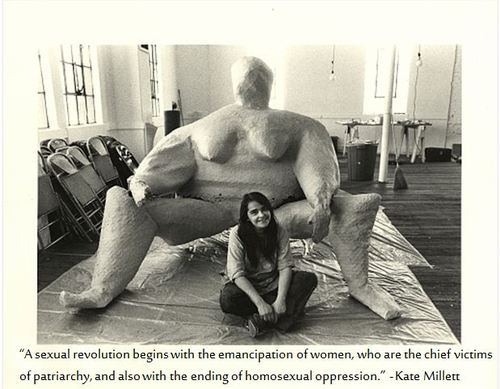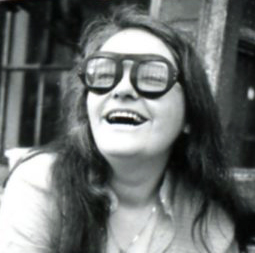Kate Millet: Revolutionary Feminist and Spoiled Brat
September 2, 2014

I MET Kate Millet in the late 1970s. A few other proud, brainwashed, starry-eyed feminists at McGill University in Montreal, Canada and I arranged to have her come speak at the university. We picked her up from the airport on a snowy night and took her to a fancy French restaurant, where she drank a lot of wine, so much so that we nervously wondered whether she would be able to deliver the tour de force lecture we were all expecting. During her talk, women in burkas burst into the lecture hall and chanted pro-Ayatollah Khomeini slogans. It was frightening — a chilling and foreboding convergence of revolutionary and totalitarian ideologies, though I didn’t know it at the time.
I must confess, I had not read all of Millet’s famous treatise, Sexual Politics. But then you didn’t need to read it. Millions of Marxists never read Marx. It was the same with feminism. You just knew it was all so true. Nevertheless, my secret impression of the author was of a woman who was boozy, physically unattractive, and bored.
At Front Page Mag today, Mallory Millet, sister of Kate Millet, reflects on her famous sister’s legacy. It’s an amazing behind-the-scenes look at an American revolutionary. I would like to post the whole thing it is so interesting, but go to Front Page and read it all.
Mallory joined up with her famous sister in New York City after having married and divorced an American executive working in Southeast Asia.
It was 1969. Kate invited me to join her for a gathering at the home of her friend, Lila Karp. They called the assemblage a “consciousness-raising-group,” a typical communist exercise, something practiced in Maoist China. We gathered at a large table as the chairperson opened the meeting with a back-and-forth recitation, like a Litany, a type of prayer done in Catholic Church. But now it was Marxism, the Church of the Left, mimicking religious practice:
“Why are we here today?” she asked.
“To make revolution,” they answered.
“What kind of revolution?” she replied.
“The Cultural Revolution,” they chanted.
“And how do we make Cultural Revolution?” she demanded.
“By destroying the American family!” they answered.
“How do we destroy the family?” she came back.
“By destroying the American Patriarch,” they cried exuberantly.
“And how do we destroy the American Patriarch?” she replied.
“By taking away his power!”
“How do we do that?”
“By destroying monogamy!” they shouted.
“How can we destroy monogamy?”
Their answer left me dumbstruck, breathless, disbelieving my ears. Was I on planet earth? Who were these people?
“By promoting promiscuity, eroticism, prostitution and homosexuality!” they resounded.
They proceeded with a long discussion on how to advance these goals by establishing The National Organization of Women. It was clear they desired nothing less than the utter deconstruction of Western society. The upshot was that the only way to do this was “to invade every American institution. Every one must be permeated with ‘The Revolution’”: The media, the educational system, universities, high schools, K-12, school boards, etc.; then, the judiciary, the legislatures, the executive branches and even the library system.
It fell on my ears as a ludicrous scheme, as if they were a band of highly imaginative children planning a Brinks robbery; a lark trumped up on a snowy night amongst a group of spoiled brats over booze and hashish.
To me, this sounded silly. I was enduring culture shock after having been cut-off from my homeland, living in Third-World countries for years with not one trip back to the United States. I was one of those people who, upon returning to American soil, fell out of the plane blubbering with ecstasy at being home in the USA. I knelt on the ground covering it with kisses. I had learned just exactly how delicious was the land of my birth and didn’t care what anyone thought because they just hadn’t seen what I had or been where I had been. I had seen factory workers and sex-slaves chained to walls.
Mallory later observes the personal devastation and heartbreak the Revolution causes in the lives of the women she knew. It’s a terrific piece, though sad to think of the sisterly estrangement it represents. Alas, the Sisterhood is for true believers.

— Comments —
Ron Carpenter writes:
You mention meeting Kate Millet in the 1970s and that she appeared disturbing at supper. Here is another essay by her sister who witnessed her mental breakdown.
Mary writes:
Astonishing, all of it. Millett herself; that Laura Wood had dinner with her; the litany that was chanted; the progress that has been made, with a madwoman at the helm.
I can’t help but be reminded of Shulamith Firestone, who’s The Dialectic of Sex: The Case for Feminist Revolution was published in 1970, the same year in which Millett’s book Sexual Politics was published. Both women suffered from devastating mental illness, which leads to the obvious question: are only madwomen driven to promote the radical abandonment of the natural order? Or does the radical abandonment of the natural order drive it’s promoters mad?
John G. writes:
It’s fascinating to imagine you sharing a stage with Kate Millet. It turns out that your fears about how it would turn out were more than justified. From the article by Mallory Millet which Mr. Carpenter mentioned:
“During the speech after the screening she fell apart onstage before a packed assembly of fawning admirers. It was a standing room only audience. In fact, they had had to schedule a second screening at the last minute, as the response had been huge. As I sat next to her lectern during her incoherent ravings I witnessed the pained looks of confusion as they swept across those faces like a small gale whipping up across the top of a sea; at first tiny ripples gliding across the surface. They were polite until the realization took shape that she was making no sense whatsoever. People began glancing at each other, whispering a little then turning to one another with more energy, politeness gone, as some began to get up and leave. Soon many were slipping out and that was followed by a mad dash for the exits. She was babbling and shouting incoherently whilst I nodded and pretended every word made perfect sense. I could not bear to betray her in public. I sat there feeling my heart melting through my chest and draining into my belly with an indescribable sick empathy. Her humiliation was unbearable as the gale whipped up to a force ten and with one last enormous surge we were left in an empty room. The second screening was cancelled.”
Mallory Millet makes the point that these icons of feminism were completely crazy. Not just a little eccentric. Really, truly, straight-jacket crazy. Dangerously, scarily crazy. And today there are millions and millions of women imitating their lives.
David writes:
I was re-reading your post on Shulamith Firestone after reading your more recent one on Kate Millet (I would never find these things if not for your blog), and came across this statement of yours which had not stood out to me previously:
“In light of the fact that the nihilistic, atheistic trend of Western Civilization for at least the last two hundred years was producing a significant number of rotten men, feminism is easier to comprehend.”
It can’t be true that the men of the last two hundred years are any worse than the men who came before them. What evidence would you put forward that this is the case?
Laura writes:
By “rotten,” I meant soulless, empty, materialistic men. Men who worship scientism or other abstractions.
(And I said, “a significant number.” Not all men.)
Why can’t it be true? Look at the French Revolution, modern philosophy and Communism. Look at the abandonment of God on the social level. Look at the sheer coldness and indifference to the Eucharist, the greatest act of love in human history. Look at the numerous visions of the Blessed Mother, in which she describes her lacerated heart.
The Revolution began more than 400 years ago.

